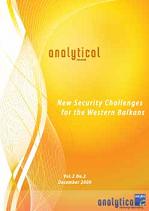HUMAN SECURITY IN FOCUS
HUMAN SECURITY IN FOCUS
Author(s): Ivana TomovskaSubject(s): Politics / Political Sciences
Published by: Аналитика Тинк-тенк Организација
Summary/Abstract: In the last few decades the concept of security has grown, both to satisfy new demands for securitization and also to address the new challenges created by globalization. With the expansion of security there has been a parallel process of norm transition with respectable normative consequences for the security agendas of the actors in the international political arena. In order to investigate the concept of human security one needs to look at three issues: firstly, what is individual/human security - is it problem-based or category-based? The other issues to be considered are emancipation and individual security, and the state as a threat to individual security and humanitarianism. To do this, one must examine the referent object, securitizing actor and the source of threat to the concept of individual/human security. The theory of ‘securitization’ involves the search for a referent object, or according to Buzan’s argument, ‘Securitization can thus be seen as a more extreme version of politicization’ (Buzan et al. 1998, 23). Securitization is particularly concerned with three questions: ‘security of whom’ (or referent object); ‘security of what’ (what are the values at risk) and ‘security from whom or what’ (what are the sources of threat) (Møller 2000, 43). Prior to the end of the Cold War security was measured in rather narrow, militaristic terms, focused on ‘national security’ and the survival of the state. The post-Cold War environment can be considered as a renaissance of security studies by taking a new, more humanistic approach. Expressed in theoretical terms, the focus of security has shifted, providing a new concept of ‘human security’. Human or individual security treats the following parameters: the referent object is the individual and humanity as a whole; values at risk vary from mere survival of the individual to quality of life and human rights; possible source of threat can be the state but also the impact of globalization (Møller 2000, 43). If the source of threat used to be solely external (conflict between states), now the source of threat can also be internal (interstate conflict). Another imposing issue while analysing human security is the epistemological issue – what is its level of analysis; is it examining the individual while maintaining system level analysis? The nature of knowledge should be acquired by analyzing the individual, however in a wider, even global perspective.
Journal: Analytical
- Issue Year: 2009
- Issue No: 04
- Page Range: 40-46
- Page Count: 7
- Language: English

